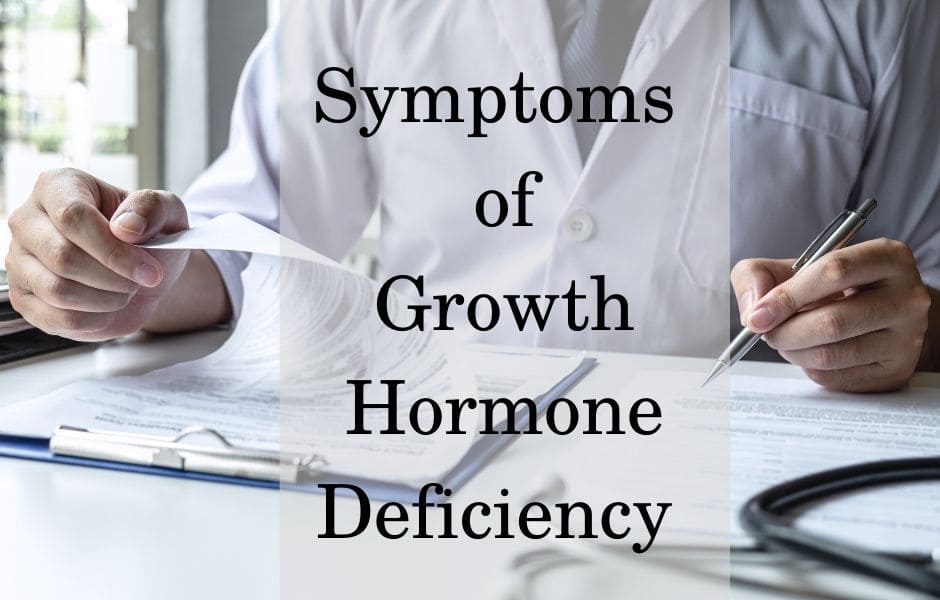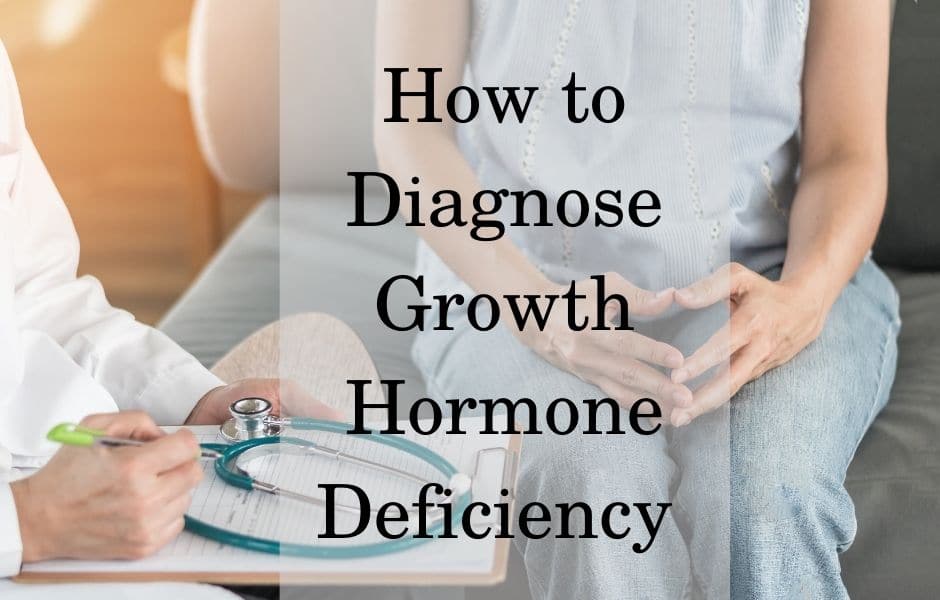The function of the human growth hormone (HGH) is often overlooked when it comes to adults. However, growth hormone deficiency (GHD) can present itself with serious symptoms during adulthood that will decrease the quality of your life.
In the US alone, around 6 000 adults are diagnosed with GH deficiency every year. If the symptoms are left unchecked, GHD can also lead to long-term complications and reduce the person’s life expectancy.
Getting your information on growth hormone deficiency symptoms from reputable sources based on scientific evidence will help you make the right choice and receive proper diagnosis and treatment from qualified specialists.
What is growth hormone deficiency?
GHD is a relatively uncommon condition that affects 1 – 3 per 10 000 people according to studies. The cases of growth hormone deficiency that have an adult-onset (AGHD) are a bit rarer. AGHD has a rate of approximately 10 – 16 cases per million, according to different trials.
In the US, out of the 6 000 adults diagnosed with GH deficiency annually, 10-20% of those cases are childhood-onset GHD that is first diagnosed in adulthood
GH deficiency occurs when the pituitary gland no longer functions properly. The production of HGH is significantly reduced or seizes completely which leads to debilitating symptoms.
Low HGH levels lead to problems in the overall metabolism of the body, disturbed mental health, and overall well-being. The condition can also disrupt the hormonal balance of the body. GHD is often associated with changes in the levels of sex hormones, thyroid hormones, and adrenal hormones.
The indirect effects of HGH are mediated by the Insulin-like Growth Factor-1 (IGF-1). HGH stimulates its production in the liver, and IGF-1 mediates its anabolic effects. IGF-1 is responsible for stimulating the growth and repair of nearly all body tissues.
9 Symptoms of growth hormone deficiency
The first signs of growth hormone deficiency in adults are the changes in body composition. They are characterized by an increased level of fat around the abdomen and a reduction in muscle mass and strength.
Low growth hormone symptoms are usually followed by a reduced sense of well-being, lower energy levels, depression, decreased libido, and sleep problems. Long-term symptoms can also include osteoporosis and an increased risk of cardiovascular diseases.
Growth hormone deficiency leads to reduced life expectancy and almost two-fold increased mortality from cardiovascular diseases according to epidemiological data. That’s an effect caused by the premature development of atherosclerosis in patients with growth hormone problems.

Increased body fat
Low growth hormone can lead to reduced stimulus on lipolysis. The result is an increased subcutaneous fat accumulation, mostly around the abdomen. Besides, it can lead to increased levels of visceral fat – a dangerous type of fat that builds up around internal organs and increases the risk of diabetes and heart disease.

Decrease in muscle mass and strength
HGH has a sparing effect on muscle tissue and prevents muscle loss. Without the protective effect of growth hormone, AGHD can lead to muscle loss and muscle weakness. In combination with the abdominal fat gain, this results in unhealthy changes in body composition.

Osteoporosis
Normally, HGH has an anabolic effect on bone tissue that is mediated by IGF-1. GH deficiency reduces this effect and speeds up the bone loss that occurs with age. The result is reduced bone density and higher fracture risk.

Lack of motivation and energy
Patients with GH deficiency often experience a lack of energy and chronic fatigue. This often results in a loss of motivation and decreased productivity.

High blood pressure and high bad cholesterol
GHD related visceral obesity can significantly increase the risk of cardiovascular diseases. Elevating levels of LDL (bad) cholesterol and decreased levels of HDL (good) cholesterol. Cause hypertension (high blood pressure) and increase the risk of heart disease.

Mental health problems
GHD in adults can lead to atypical depression in both men and women. Growth hormone deficiency can also lead to symptoms ranging from mood changes to complete social isolation.

Sleep problems
Growth hormone deficiency is often linked to sleep-related disturbances such as poor sleep quality, increased daytime sleepiness, and fatigue. These symptoms might be caused by different hormonal changes linked to GH deficiency.

Impaired quality of life
Growth hormone deficiency can lead to reduced quality of life which is the result of multiple physical and psychological complaints. They include bad concentration and memory, mechanical and thermal hypersensitivity and more.

Reduced Sexual Desire
HGH levels play a role in sexual desire in both men and women. GH is important for normal arousal and the maintenance of normal erection in men. Low levels of HGH can lead to low libido and sexual problems.
Find out moreWhat are the causes of GHD?
Growth hormone deficiency occurs sporadically or in relation to other conditions, traumas, and treatments. However, studies suggest that 3−30% of GHD patients also have an affected family member suggesting that some cases can be inherited. They present as cases of congenital GHD with childhood-onset. Thus, growth hormone deficiency can be three types according to its etiology.
Congenital growth hormone deficiency
Congenital GHD is always present since a person’s birth and the symptoms occur in early childhood. The symptoms include slow growth of the child, hypoglycemia, and underdeveloped genitalia in boys. This type of deficiency is caused by:
- genetic abnormalities (some of which inherited)
- complications during delivery
- association with other genetic syndromes such as Prader-Willi and Bardet-Biedl
Acquired growth hormone deficiency
Acquired GH deficiency can occur in both children and adults. It is always caused by factors that occur after birth, damage the pituitary gland, and normal HGH production seizes. This is the most common type of adult-onset GHD. The most common causes are:
- brain surgery
- ionizing radiation
- traumatic brain Injury
- brain tumors or metastasis
- infection or inflammation inside the brain
- infarction of the hypophysis or hemorrhage
Idiopathic growth hormone deficiency
GHD is called idiopathic when the cause of the condition cannot be determined and remains unknown. This type of GH deficiency almost always occurs in children and rarely in adults.
How to diagnose growth hormone deficiency
Proper GH deficiency diagnosis requires an in-person meeting with a qualified medical specialist. Your doctor has to perform a physical examination and specific tests to prove or rule out GHD as the cause of your symptoms.
During the medical exam, your physician will evaluate your symptoms and determine if they are typical for GHD. Furthermore, the doctor has to perform a stimulation test to determine your peak HGH values.
A regular blood test is not sufficient for determining your HGH levels, because the hormone normally fluctuates throughout the day. It’s affected by numerous different factors and it’s normal for patients to have HGH levels reaching zero and be undetectable at times without having a growth hormone deficiency.
HGH is a stress hormone, which elevates during low blood sugar and stimulates the mobilization of fat for energy production. Based on this function, the HGH stimulation test provokes peak HGH release by using medications that induce hypoglycemia. Your blood sugar levels must drop at or below 2.2 mmol/l (40 mg/dl) for the test to be successful.
The medication accepted as a gold standard is insulin, and the procedure is called Insulin Tolerance Test (ITT).
Normal HGH peak should be up to 10 ng/mL in men and 14 ng/mL in women. If your HGH levels do not reach 7 ng/mL then your doctor can diagnose you with GHD
Growth hormone deficiency treatment
If GHD is left untreated, it will significantly reduce the quality of your life. Studies show that long-term GHD without proper treatment leads to a progressive deterioration in physical mobility and reduced vitality.
GHD can shorten the life expectancy of patients due to an increased risk of cardiovascular events
In order to receive a safe and effective treatment, you need a legal HGH prescription. You can obtain it only from a qualified specialist who will evaluate your symptoms and test results, and then determine your diagnosis. If you are prescribed HGH therapy, your doctor will closely monitor your treatment to optimize its effectiveness and avoid adverse reactions.
Currently, the only safe and effective treatment for growth hormone deficiency is via injections with exogenous growth hormone that is derived using recombinant DNA technology. The recombinant GH has an identical protein structure to the one naturally produced in the human body. Thus it also has the same effects and safety profile when used in physiological doses.
A qualified doctor will help you to consider the best HGH injections for GHD. Avoid buying counterfeit products that are shipped from overseas. Their ingredients, safety and effectiveness are unknown. Obtain HGH injections only from licensed pharmacies and reputable manufacturers.
The Takeaway
The symptoms of growth hormone deficiency can affect both your life quality and expectancy. Initially, they include abdominal fat gain followed by a decrease in muscle mass, physical capacity, energy levels, vitality, sexual function, and mental well-being.
If GHD is left untreated it can lead to osteoporosis, atherosclerosis, and increased cardiovascular mortality.
To address your symptoms successfully, you should visit an experienced medical specialist.
At Best HGH Doctors and Clinics we offer you a team of highly qualified doctors and endocrinologists to ensure safe and effective treatment of AGHD.



 Request Appointment
Request Appointment


